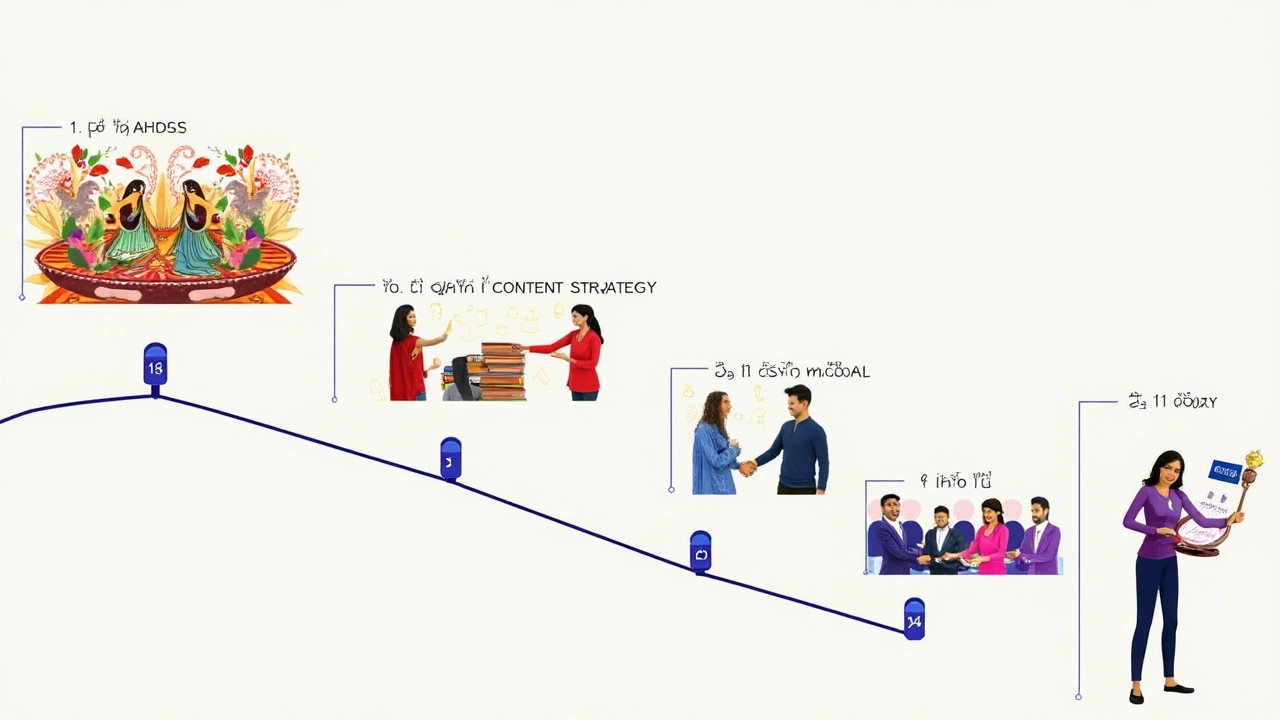Blogging is an adventurous journey with unique trails and milestones. Aspiring bloggers often dream of turning their passions into profitable ventures, but the road to success doesn't have a fixed timeline. One may wonder how long it actually takes for a blog to thrive in the bustling digital world.
While the answer isn't straightforward, various factors play a critical role in determining the timeline. From the quality of content you're crafting to the audience you're engaging with, every element counts. By examining successful bloggers and their experiences, we can gather valuable insights to carve out our path to blogging success.
- Understanding Blogging Success
- Key Factors Influencing Success
- Developing Quality Content
- Building Audience Engagement
- Case Studies of Successful Blogs
- Effective Strategies for Monetization
Understanding Blogging Success
Blogging success is a tantalizing concept that varies greatly from one individual to another. What signifies success for one blogger might be different from what it means for another. At its core, achieving success in blogging often revolves around the intersection of personal satisfaction, audience growth, and financial gains. For many, it's about transforming a humble web journal into a thriving digital platform that captures the attention of thousands or even millions. To truly understand blogging success, one must appreciate that it isn't an overnight phenomenon; rather, it's the culmination of consistent effort and strategic decision-making.
Success in the blogging realm evolves as trends shift and platforms innovate. Bloggers today must be adept at leveraging social media, SEO, and digital marketing to maximize reach and impact. It is crucial to identify one's niche and develop content that resonates not just superficially but meaningfully with the target audience. A blogger who understands the importance of these elements will already be two steps ahead in their journey towards success. According to a 2023 study by HubSpot, it takes regular and strategic content posting—about 4-5 times a week over 9-12 months for blogs to begin gaining noticeable traction in search engine rankings.
"The key to blogging success lies in the consistency of your content and the relatability of your voice." - Darren Rowse, pro-blogger
The notion of success is often tied to financial earnings in the blogging community, with the aim of transitioning from a side hustle to a full-time income. In monetization, strategies like affiliate marketing, ad networks, sponsored posts, and product sales come into play. Affiliate marketing alone, as stated by Statista, is a billion-dollar industry with growth projections indicating further escalation. Bloggers who can effectively incorporate such monetization strategies without eroding the trust of their readers are well on their way to succeeding. However, understanding your audience's preferences and monetizing appropriately is a skill that often requires trial and error.
It's essential to note the impact of personal fulfillment in the broader picture of blogging success. The joy of expressing creativity, documenting personal stories, or advocating for change, holds significant value. Many successful bloggers began without a direct intention to monetize but grew into it. Cultivating a balanced approach between passion and profit can indeed be the key. This balance allows bloggers to navigate through the volatile shifts in digital trends and competition. Readers can sense authenticity, and it becomes a critical compass for why some blogs flourish while others falter.
The journey to blogging success involves adaptability, learning, and calculated risks. The path can be filled with moments of self-doubt and exhilarating achievements alike. What's crucial is maintaining a clear vision of what success means on a personal level and aligning actions to those goals. Successful bloggers often iterate; they evolve as trends and technologies do. In today's fast-paced world, the capacity to swiftly adapt to change can undeniably position a blog for enduring success. Through analyzing metrics and understanding reader engagement, bloggers develop an intuition to predict shifts that matter. With the future landscape becoming increasingly competitive, laying a robust foundation with smart strategies and authentic content is more important than ever. So, as you embark on this journey, remember, understanding blogging success is just the beginning; the real journey involves carving out a sustainable and rewarding path forward.
Key Factors Influencing Success
When embarking on the journey to achieve blogging success, understanding the critical factors at play is crucial. First, quality and consistency stand out as fundamental pillars. It becomes imperative for bloggers to consistently deliver high-quality content that resonates with their audience. This not only enhances reader loyalty but also improves search engine rankings. Crafting well-researched and engaging content with a personal touch can set a blog apart from the myriad other voices in the digital space.
Another key player is the niche or subject matter of the blog. Catering to a specific niche can streamline the path to blog growth as it helps carve out a dedicated audience. Identifying a niche not only helps focus the blogger's content strategy but also aids in attracting advertisers targeting that demographic. For example, finance blogs often experience brisk success due to high demand for expert advice on managing money. Of course, not every popular topic will bring success if it isn't accompanied by passionate and innovative storytelling.
Audience engagement remains a cornerstone. A blog can truly flourish if it successfully builds a community around its content. Offering interactive features like comment sections or forums promotes active participation. This engagement can help bloggers understand their readers’ needs and adapt their content strategy accordingly. A blogger who listens and responds builds deeper connections, fostering loyalty and promoting growth through word-of-mouth recommendations.
"Quality is more important than quantity. One home run is much better than two doubles." – Steve Jobs
Leveraging social media and other distribution channels is another pivotal aspect of achieving success. Sharing content across various platforms not only increases visibility but also attracts a broader readership. Successful bloggers deploy strategies to drive traffic from social media, such as crafting eye-catching headlines and visuals that entice potential readers to click through to the main site.
Monetization avenues, though usually a product of success, often influence a blog's trajectory. Bloggers who efficiently incorporate diverse revenue streams, such as affiliate marketing, sponsored posts, or digital products, frequently sustain their ventures longer. However, balancing monetization with authentic storytelling is key to retaining reader trust.
Lastly, patience and persistence form the bedrock of any successful blog. It's crucial to understand that blogging success isn't an overnight affair. Rather, it's a gradual process, often taking a year or more to truly take off. As with any meaningful pursuit, bloggers must be willing to invest time, continuously learn, and adapt to the ever-evolving digital landscape. And in those moments of doubt, looking back at the progress made can serve as a powerful motivator.

Developing Quality Content
Creating quality content is the cornerstone of achieving blogging success. It's what sets your platform apart, attracting readers and keeping them engaged. In the world of blogging, quality isn't just about stringing words together but about weaving stories that resonate with your audience. To embark on this journey, it's crucial to understand the needs and interests of your target audience. Conducting surveys or engaging in communities where your audience hangs out can offer deep insights into their preferences. These interactions are gold mines for content ideas, topics that are evergreen as well as those that cater to prevailing trends.
Originality should be at the heart of your content. With billions of blogs out there, standing out necessitates a unique voice. It's about expressing your individual perspective on a topic, incorporating personal anecdotes, and perhaps drawing on your professional expertise. Authenticity fosters a deeper connection with readers, making your blog not just a source of information but a place of camaraderie. Quality content encompasses thorough research and factual accuracy. Readers today are discerning, and misinformation can severely damage your credibility. An underappreciated aspect of engaging content is the narrative style and structure; employing storytelling techniques or using captivating headlines can draw readers in and sustain their interest.
Balancing variety and consistency in content is equally important. While delving deeply into niche topics can establish your authority, providing a mix of content types—such as listicles, how-tos, or interviews—keeps your blog dynamic. Some successful bloggers, like Arianna Huffington, founder of The Huffington Post, recognized early on the power of diversified content. "We didn't just want to inform; we wanted to engage and inspire," she once said. It's a sentiment every blogger should take to heart. Varied pacing, incorporating visual elements like images or infographics, and employing multimedia enrich the reading experience and cater to different learning preferences.
There is also a technological aspect to creating quality content: understanding and leveraging SEO. Proper keyword usage doesn't mean stuffing your text with irrelevant terms but seamlessly integrating keywords like make money blogging naturally. Long-tail keywords especially help in reaching niche audiences. Google's algorithms value quality, informative content over keyword-laden gibberish. Tools like Google's Keyword Planner, Yoast SEO, or SEMrush can be invaluable for optimizing your posts. Mastering SEO doesn't happen overnight, but consistent efforts lead to visible improvements in organic traction.
Another facet of quality is readability. Content should be accessible to and comprehensible by your readers. Ensure readability by using clear, concise language, and organize your posts with sub-headings and bullet points. Hemingway Editor or Grammarly are tools that assist in maintaining a readable and engaging narrative. Also, strive to create engaging CTAs (calls to action) to encourage readers to interact with your content, whether it's through comments, shares, or subscriptions. Engaging CTAs reinforce a community atmosphere and foster reader loyalty.
Regular updates are part of maintaining blog growth. Stale content can divert readers to more current sources. One study highlighted that blogs that post frequently have a higher rate of returning visitors. Scheduling a content calendar can aid in staying consistent and relevant. It's worth noting too that updating older posts with new information or a fresh perspective can revitalize traffic to older, yet valuable content. Not only does this improve SEO, but it also reaffirms your commitment to providing value to your readers on a continual basis.
Building Audience Engagement
Creating a blog is just the beginning. The secret to thriving in the world of blogging is to focus intently on building strong audience engagement. A blog isn't just a platform to speak from; it's a community to nurture. Developing meaningful connections with your readers ensures that your blog maintains its relevance and position in the vast sea of online content. To start with, understanding your audience is key. Knowing their interests, concerns, and preferences helps tailor content that truly resonates. Crafting personalized and relatable posts often means the difference between fleeting visits and loyal followers. This sense of understanding, coupled with engaging content, helps draw your audience into a deeper relationship with your blog.
Once you've understood your readers, employing interactive techniques takes the engagement to the next level. Using comments and feedback is an incredible way to open a dialogue with your audience. Encouraging readers to share their thoughts not only brings valuable insights but also fosters a sense of community. Moreover, hosting webinars and live Q&A sessions can spark interest and allow for direct communication. These interactions make your audience feel valued and appreciated, driving higher engagement rates. As Stephen R. Covey famously said, "Seek first to understand, then to be understood." Applying this principle in your interactions with readers can create devoted fans who consistently support your blog.
It's crucial to leverage social media as part of your engagement strategy. Social media platforms extend the reach of your blog, enabling sharing and interaction beyond the confines of your website. Regularly updating these channels with intriguing content and participating in online conversations helps maintain visibility and awareness. Using SEO-friendly keywords like blogging success and audience engagement ensures that your content is easily discoverable by potential readers. A powerful tip is the strategic use of hashtags related to your niche. These help your posts reach those who are genuinely interested in similar topics. To take things up a notch, collaborative opportunities with influencers in your space can give your engagement rates a significant boost.
Using Email Strategically
Email marketing remains one of the longest-standing yet effective ways to maintain a connection with your audience. Sending personalized newsletters with curated content can keep readers informed and interested in your blog's progress. It's important to use this channel wisely—balancing helpful insights and promotional content. Regularly evaluating engagement metrics like open rates and click-through rates can provide indications of what resonates with your audience. Creating exclusive offers or behind-the-scenes content for email subscribers can also be a successful strategy to enhance engagement. This approach not only aids in building a stronger community but also solidifies the identity of your blog in the readers' minds.
| Strategy | Effectiveness Rating |
|---|---|
| Social Media Interaction | High |
| Email Marketing | Medium |
| Live Webinars | High |
Ultimately, building audience engagement demands authentic connection, consistent communication, and strategic planning. The journey can be daunting, but those who are willing to invest time and energy into nurturing their community will find their efforts rewarded. Readers become partners in your blog's journey, leading to a thriving and vibrant platform for growth and success.

Case Studies of Successful Blogs
When it comes to understanding the journey towards blogging success, real-world examples can provide unparalleled insights. Consider the story of Pat Flynn, the mind behind the popular blog Smart Passive Income. Pat started his blog back in 2008 after losing his job as an architect. His tale is one of trial and error, mixed with genuine experiments in online income generation. Such a transparent view into his world significantly boosted his blog's credibility, leading to an engaged audience who appreciated his honesty. Taking a note from his approach, many bloggers have learned to embrace authenticity to connect better with their readers.
Another fascinating journey is that of Michelle Schroeder-Gardner, the brains behind Making Sense of Cents. Her blog stands as a testament to strategic pacing and focused niche content. Michelle started her blog to track her progress in paying off student loans, and it gradually evolved into a comprehensive financial advice platform. She consistently emphasizes the importance of delivering value-rich content, which not only draws visitors but also encourages them to return. Her focus on personal finance struck a chord with a wide audience, eventually creating a broad and loyal following. Her approach shows the impact of content geared towards solving particular problems faced by the readers.
"Consistency and persistence are what cultivate a blog's success, but it's the ability to adapt that ensures its longevity," notes Darren Rowse of ProBlogger. His blog is designed to assist fellow bloggers in overcoming hurdles while profiting from their writing endeavors. Since its inception in 2004, ProBlogger has emerged as an indispensable resource featuring industry insights, helpful tips, and encouraging stories. Darren's blog success stems from the foundational knowledge provided and his engagement with bloggers through diverse content formats.
Moreover, there's the captivating growth of fashion and lifestyle blogs such as Cupcakes and Cashmere by Emily Schuman. Originally launched to explore her knack for fashion, decor, and food inspiration, her blog rapidly garnered attention due to its balance of personal touch and aesthetic appeal. She successfully leveraged partnerships and brand sponsorships, demonstrating that a well-curated blog can grow organically while also tapping into larger commercial opportunities. Her blog illustrates how audience interest can be directed into valuable collaborations when nurtured correctly.
Summing up these successful journeys, there's a clear pattern of dedication, adaptability, and a strong connection with the audience. These bloggers started with small, continuous steps toward their goals, using their personal strengths and interests to captivate and grow their audiences. Their stories teach aspiring bloggers that while each path to success may differ, certain elements – like producing quality content, understanding audience needs, and keeping authentic connections – remain constant in realizing a rewarding blogging experience.
Effective Strategies for Monetization
Making money from a blog isn't just about writing good content; it's about integrating the right monetization strategies at the right time. One prevalent method is incorporating affiliate marketing. It allows bloggers to earn a commission by promoting products relevant to their niche. The key is to choose products that not only align with your blog's themes but also resonate well with your audience. Many successful bloggers report that selecting products they personally use and endorse increases authenticity and conversion rates.
Another lucrative strategy is to utilize paid advertising. It includes banner ads, sponsored posts, and even ad networks like Google AdSense. These channels pay bloggers for the exposure they provide to advertisers, creating a steady income stream. However, balance is crucial. Overloading your site with ads can deter visitors, potentially harming long-term growth. Maintaining a pleasant user experience should always be a priority.
In recent years, selling digital products such as eBooks, courses, or exclusive content has become a popular way to monetize. These products often require a significant initial time investment but can yield substantial returns as you gain credibility. According to a 2023 survey, 67% of bloggers who earned over $50,000 annually did so through digital products. This high-profit potential encourages many to develop offerings that educate or entertain their audience.
Building Partnerships For Additional Revenue
Besides direct income methods, building partnerships can form another path to success. Collaborating with brands for sponsorships or events can enhance your blog's reach and authority. Such partnerships should be chosen carefully, ensuring the brand’s values align with those of your blog. Readers trust your recommendations; protecting that trust is essential.
Jeff Rose, a veteran blogger, notes, "Monetization isn’t just about income; it’s about matching your blog’s voice with the right opportunities."
Embracing Subscription Models
Subscription-based models or membership sites represent another effective approach. These involve offering exclusive content to dedicated followers on a paid basis. Such a model fosters a community feel, encouraging readers to support your work. It can be particularly beneficial for niche blogs where information is highly specialized. To succeed, it’s crucial to consistently deliver value that justifies the cost, aligning your offerings with reader expectations. The journey can be demanding, but the personal connection and recurring income it facilitates are often deemed worthwhile by many successful bloggers.
Incorporating these methods strategically can significantly affect how quickly a blogger achieves monetization goals. It is a complex process requiring dedication, market understanding, and audience engagement. But as many have proven, persistence pays off in the blogosphere.



